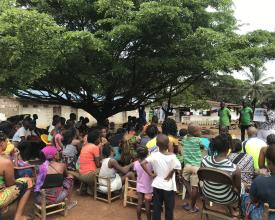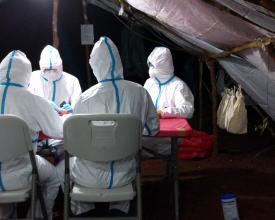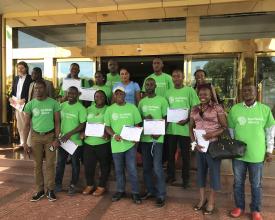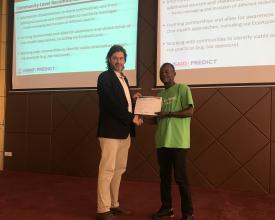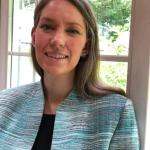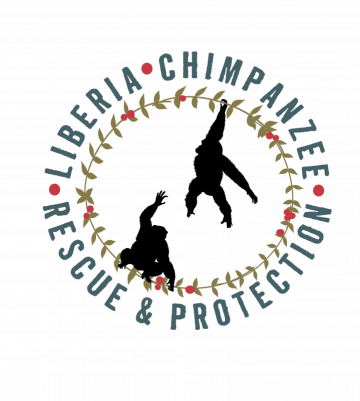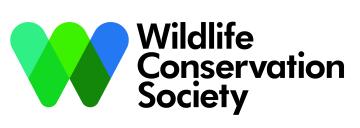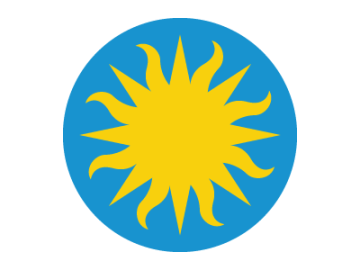
Integrating Biodiversity and Health Messaging and Tackling Superstition with Communities in Liberia
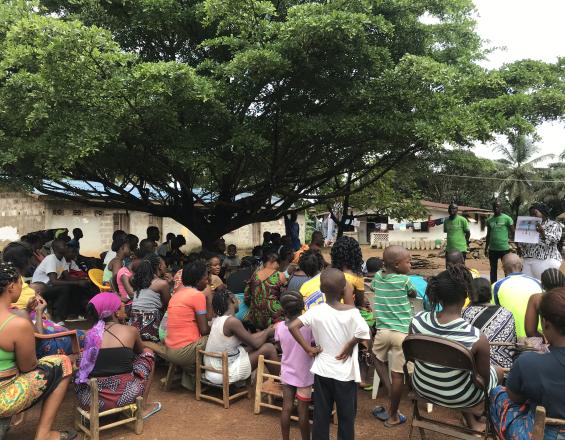
Liberia is a diverse nation with a wide variety of tribal, cultural, and religious practices, where the majority of the population depend on the forest and its resources for their livelihood. Such interactions with the forest environment put people at risk of contracting zoonotic diseases that may spill over from animals. However, widely spread beliefs that traditionalists, witches, wizards, and even spirits have the ability to cast diseases upon people continue to hamper the prevention, diagnosis, treatment, and control of many diseases. Under the PREDICT-2 project, Liberian One Health experts trained in health, conservation, and social sciences conducted biological and behavioral surveys, followed by community outreach that improved awareness and acceptance of zoonotic disease risk reduction practices. Using the ‘Living Safely with Bats’ book, this outreach also reinforced biodiversity protection and animal welfare. Its success was enabled by trust, awareness, and a strong evidence base.
Context
Challenges addressed
During the Ebola virus crisis in Liberia, health authorities told Liberians not to eat bats, monkeys, and other animals that could potentially play a role as a reservoir or host of the virus. Some Liberians still believed that Ebola didn’t come from bats or other animals, reinforced by their own historical experience eating bats without recognized disease consequences. There are strong cultural beliefs about the source of illness, linked to superstition. Thus, it was difficult for people to listen to the health authorities during the epidemic, and the bat hunting, killing, and consumption of bats has continued. When visiting communities at the start of the project, the field team was initially met with skepticism, and there was concern when people saw the personal protective equipment used for animal sampling that had been associated with Ebola response. Overcoming this required sustained engagement to build trust and share information about the purpose of the project.
Location
Process
Summary of the process
Building trust provided the foundation for successful research and awareness raising. This was an iterative process over time, integrating findings and information from the Liberian context to develop effective and tailored messaging. Longstanding cultural beliefs and livelihood and food security challenges meant that research findings alone would not have been successful in changing practices. The balance of health protection needs, pressures on biodiversity and ecosystems related to land use change and hunting and wildlife trade, and daily dependence and interactions with wildlife and domestic animals required messaging that could only be achieved with a One Health approach.
Building Blocks
Trust building
Communities were initially concerned about outsiders coming to their villages. Sustained engagement with community leaders, and outreach to community members, helped to establish trust over time. In particular, a key feedback was hearing the appreciation that the team came back to share information.
Enabling factors
Implementation by Liberian scientists ensured the local conditions, complexities of the issue, and needs were considered. Building in time and resources to return to communities from the start of the project was important, to be able to honor promises to return to share information from the evidence base.
Lesson learned
Perception and understanding of the issues varies by community. Local leaders, such as Paramount Chiefs, play a crucial role in their communities and are vital partners in trust building.
Awareness raising
Many people interact with wildlife and domestic animals in Liberia, but overall awareness about zoonotic disease risks is low. Raising awareness involved information about the purpose of the project, as well as dedicated engagement using the 'Living Safely with Bats' visual book. This messgaing integrated biodiversity and health information, in line with a One Health approach.
Enabling factors
Collaboration on an international project allowed for sharing and optimization of materials, including adaptation of the information and visuals in the 'Living Safely with Bats' book to the Liberian context. Holding engagement sessions as a group allowed for questions and norms to be considered in a respectful and open community-led manner. The trust established allowed for the messages to be positively received.
Lesson learned
Changing perceptions and norms takes time and sustained engagement, particularly in settings where health literacy is limited. With accurate information and practical strategies for their context, communities are empowered to take on actions that reduce disease risk and protect animals and ecosystems.
Resources
Evidence through research
Pathogen and disease detection under the PREDICT and PREDICT-2 projects as well as other research initiatives have generated a strong evidence base on the drivers of zoonotic diseases. In Liberia, the finding of Ebola virus antibodies in a bat provided evidence that Ebola is circulating in wildlife in the West Africa region and signaled that there are ongoing spillover risks requiring public health attention.
Enabling factors
Involvement and partnership of international and national institutions ensured best practices in research activities. The National Public Health Institute provided important leadership to support outreach on the significance of the Ebola finding. Another key factor was the model practices demonstrated by the sampling team, involving safe handling and sampling and attention to animal welfare, which itself helped to increased awareness of these aspects by observant communities.
Lesson learned
In the past, communities in Liberia have distrusted foreign researchers and do not typically have direct access to the findings from research activities. Communities were aware of the sampling activities around their villages; by seeing Liberian scientists involved in this work with their own eyes, they were more receptive to the findings.
Resources
Impacts
Following the Ebola crisis in 2014 that took the lives of many including health workers, the USAID-supported PREDICT-2 project implemented in Liberia by EcoHealth Alliance and the Society for the Conservation of Nature of Liberia (SCNL) initiated the Ebola host project in 2016 along with neighboring Sierra Leone and Guinea. The goal of the project was to identify the wildlife reservoir for the Ebola virus that started the epidemic and to detect other related filoviruses. The project strengthened the capacity for wildlife surveillance and disease detection in Liberia by training a local workforce in wildlife and domestic animal sampling. This sampling effort resulted in the first-ever detection of Zaire ebolavirus in a bat (Miniopterus inflatus) in West Africa (Liberia), evidence that bats are an important reservoir host for this rare and deadly virus. The finding was shared with national authorities, informing risk messaging needs. To complement this, One Health risk communication outreach was conducted in 13 communities, with an interactive visual and verbal presentation and open discussion. This dialogue allowed for honest reflection about wildlife interactions in relation to household, occupational, and consumption practices. A key indicator of success was when several communities requested the information also be shared with adjacent communities given its recognized importance.
Beneficiaries
- The public, including communities living with or near wildlife
- Animals, including protected species
- Healthcare workers at risk of infection
Sustainable Development Goals
Story
In Liberia, there are widely spread beliefs that traditionalists, witches, wizards, and even spirits have the ability to cast diseases upon people, which continues to hamper the prevention, diagnosis, treatment, and control of many diseases. It is also widely believed that foreign scientists create diseases and unleash them on African populations. Whenever people cannot understand the causes of their illnesses, they blame it on either of these two beliefs. It has become difficult to make them understand, without proof, that diseases can spill over from animals to humans. This gives reason for conducting research that establishes the source of diseases, in order to provide proof and get rid of superstitions. When evidence of the Ebola virus was discovered in a bat from the PREDICT-2 project, captured in Liberia’s Northeastern Nimba district in a bat called the greater-fingered bat, this finding brought some fear among the people about eating, killing, and hunting bats. The help of the awareness and education from the 'Living Safely with Bats' book produced by EcoHealth Alliance and later taken to all the communities where the PREDICT-2 project was implemented helped to minimize the hunting, killing, and consumption of bats. This information helped to provide practical ways to keep community members and their families safe and be empowered to reduce risk in their daily lives. Some people even told us that, "we used to hunt and eat bats but because of this education from you guys, we will try by all means to avoid bats, especially where they live." The efforts of our team also strengthened conservation awareness by explaining the role played by animal species in the ecosystem. For example, native bats and rodents help maintain the forest, by taking seeds from one location to the other and supporting pollination. Our work is now being expanded on through the ‘What’s the Fever’ project looking at acute febrile illness in the country to help understand the pathogens linked to undiagnosed disease, pathogen circulation patterns in animal populations, and the risk factors for human infections. The materials and lessons learned from the PREDICT project are being used to shape One Health risk communication for communities and healthcare providers. These efforts are also in support of the role of conservation in public health protection and promotion, and reinforce overall efforts under Liberia’s National One Health Coordination Platform.

